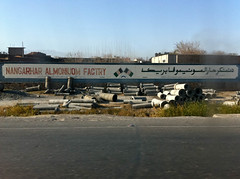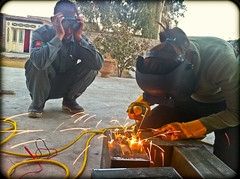 從外表看起來,賈拉拉巴德市Do Sarak住宅區的這棟建築物和附近其他住宅沒什麼差別,一樣有兒童在外面街道上玩耍。唯一不同的是,過去5年來,這棟建築物不斷傳出機械運轉的嘈雜聲──這裡是一間收集廢料製鋁的工廠。
從外表看起來,賈拉拉巴德市Do Sarak住宅區的這棟建築物和附近其他住宅沒什麼差別,一樣有兒童在外面街道上玩耍。唯一不同的是,過去5年來,這棟建築物不斷傳出機械運轉的嘈雜聲──這裡是一間收集廢料製鋁的工廠。
賈拉拉巴德市位於阿富汗東部。這裡的居民表示,社區裡的重工業,包括鋁工廠、大理石廠、碎石廠以及一間壓力鍋製造廠,讓他們的生活苦不堪言。
「鋁工廠的噪音讓我無法在家裡讀書,」Nangarhar大學的學生Zamir Danishmal抱怨道,「從早到晚我們都不能好好休息。雖然社區領導人已經多次跟Nangarhar省有關當局投訴,但根本沒人理我們。」
當賈拉拉巴德居民抱怨城市被130多間無照工廠污染,業主們也為自己叫屈,因為根本沒有其他地方可以設立工廠。
有關當局在市郊設立了4個工業區。但業界人士透露,這些工業區不但沒有供應水電,安全管理差,價格還很昂貴。此外,沒有人脈的廠商是進駐不了這些工業區的。
鋁廠老闆Mohammad Ayub Stanekzai承認他的工廠的確為當地人帶來不小困擾,但他別無選擇,「公營工業區沒有電力也沒有警衛。」他說。
當地政府環境部門的官員Raziq坦言,除了監督無照工廠造成的損失外,他所屬的部門也拿這些工廠沒轍。「我們知道工業區沒有守衛跟電力,所以我們也無法阻止工廠繼續設立在住宅區內。」
當局則聲稱工業園區已經快要可以使用了。
阿富汗投資促進局區域辦事處主任Ghulam Nabi Rahmanzai說,賈拉拉巴德市東邊的Hesar Shahi工業園區已經完工,交通電力等基礎建設也已完成,而且有40個單位已經分配出去,「萬事俱備,只欠供電。」
賈拉拉巴德市西邊,Sheikh Misri工業區主任Mohammad Nabi也承認,工業區開發進度的確比預期的緩慢。受限於成本,道路、排水和電信等基礎設施皆難以順利設置,而且警方只願意派5位警力看守園區。
 他也直指,供電是最主要的瓶頸。「只要工業園區能供電,廠商就能正常營業,並且可以自己準備警衛。」但他堅稱,工業園區是開放給任何需要的廠商進駐。
他也直指,供電是最主要的瓶頸。「只要工業園區能供電,廠商就能正常營業,並且可以自己準備警衛。」但他堅稱,工業園區是開放給任何需要的廠商進駐。
負責為工業園區設置電力設備的Breshna電力公司人員則表示,他們未被授權向媒體透露任何訊息。
Nangarhar省長Gul Agha Sherzai的發言人Ahmad Zia Abdulzai也同意,電力是工業園區營運的最大障礙,「只要Hesar Shahi工業園區一有電力供應,我們就會立即派遣警衛駐守。」
但賈拉拉巴德居民對這樣的承諾並沒有太大信心。
45歲的Do Saraka社區居民Hazrat Mohammad指控,附近的大理石廠讓孩子的呼吸系統出了問題。「早上起床時,天上下的不是雨,而是粉塵。」已在另尋其他住處的他說,「外頭租金很高,但我已經下定決心帶家人離開這裡,就算睡帳篷我也甘願。」
From the outside, the building in the residential district of Jalalabad's Do Saraka area looks like any of the family homes nearby, with children playing in the street outside.
What distinguishes it from its neighbors is the constant din of noisy machinery running inside. For the last five years, this has been the site of an plant producing aluminium from scrap.
Residents of Jalalabad, a city in eastern Afghanistan, say heavy industrial units in their neighborhoods – others include marble and gravel works and a business making pressure cookers – makes their lives unbearable.
"I can't study at home because of the noise coming from the aluminum plant," said Zamir Danishmal, a student at Nangarhar University. "We can't rest in the day or at night. Our community leaders have complained to the authorities in Nangarhar several times, but no one listens to us."
While Jalalabad residents complain that their city is being polluted by some 130 unlicensed factories, owners say they have nowhere else to set up shop.
The authorities have established four industrial zones on the city outskirts, but industrialists say that there is no electricity or water, security is poor, the plots are costly, and in any case the sites are handed out to favored friends, not those who need them.
Mohammad Ayub Stanekzai, who owns the aluminum factory, acknowledged that his business is a nuisance for locals but claimed that he has no other choice.
"The government-run industrial zones have no electricity and no security," he said.
Raziq, an official from the district's environmental department, said that beyond monitoring the damage caused by unregistered industrial units, there is little his office could do about them.
"We understand that the industrial zones have no security and no power, so we can't stop factories from being set up in residential zones," he said.
The authorities claim the industrial parks are nearly ready for use.
Ghulam Nabi Rahmanzai, director of the regional office of the Afghanistan Investment Support Agency, said work on one park at Hesar Shahi, east of the city, is now complete, with the transport and power infrastructure in place and 40 plots already allocated.
All it needs is an actual electricity supply, he said.
Mohammad Nabi, director of another industrial park, at Sheikh Misri west of the city, admitted that progress has been slower than anticipated. Cost constraints have hampered the provision of roads, drainage and telecommunications, and the police have only agreed to assign five officers to guard the park.
However, it is electricity that is the crucial issue, he said.
"If power is laid on to the industrial parks, I am sure industrialists will be able to launch their businesses, and they can bring in their own security guards," he said.
Mohammad Nabi insisted that land is freely available to any industrialist who wants it.
Officials from the Breshna electricity company, which is supposed to be laying on power to the industrial parks, said they are not authorized to talk to the media.
Ahmad Zia Abdulzai, spokesman for Nangarhar Governor Gul Agha Sherzai, agreed that electricity is the biggest single obstacle to getting the industrial parks going.
"As soon as power is provided to the Hesar Shahi industrial park, we will be ready to provide security to protect it," he said.
Such promises provide little comfort to people in Jalalabad.
One resident of the Do Saraka neighborhood, Hazrat Mohammad, 45, said the pollution from a nearby marble factory is giving his children respiratory problems.
"When we get up in the morning, it's as if dust has been falling from the sky instead of rain," he said.
Now looking for a home elsewhere in the city to escape these conditions, he said, "Rents are high, but I've decided we have to leave this area, even if that means living in a tent."
※ 全文及圖片詳見:ENS

